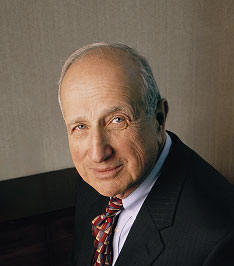Who is Bernard Gordon?
| Bernard Gordon received his B.S and M.S.
degrees in Electrical Engineering from the Massachusetts
Institute of Technology in 1949. Considered the “father of
analog to digital conversion” for his inventions and
contributions to signal translation, medical tomography and
other high-precision instrumentation, he has more than 200
patents worldwide. He founded Analogic Corporation and
recently retired as Chairman of the Board. Prior to Analogic,
he was the President and co-founder of Epsco, Incorporated.
In 1986, he received the National Medal of Technology from
President Reagan, and in 1991, he was elected a member of
the National Academy of Engineering and has been the
recipient of several honorary engineering doctoral degrees.
He is the Chairman of Lahey Clinic and a Trustee of Tufts
University. |
 |
|
| The definitions of Science,
Engineering and Technology from
http://en.wikipedia.org/wiki/Technologies#Usage.
Generally, the following distinctions can be made:
- Science is the formal process of
investigating natural phenomena. It produces information
and knowledge about the world.
- Engineering is the goal-oriented
process of designing and building tools and systems to
exploit natural phenomena for a practical human means.
Engineers work within the constraints of natural
laws and societal needs to create technology.
- Technology is the consequence of these
two processes and societal requests. Most commonly, the
term technology is used as the name of all engineering
products.
|
|
| Why
Engineering? |
|
Engineering is
ACADEMIC
GLUE
– it binds complex math and science concepts
to real-world experiences and leads to learning that sticks
with students
Engineering is
CREATIVITY
– it brings out the best ideas from the
students
Engineering is
GROUP WORK
–students learn to communicate and work
together while they learn math and science
Engineering is
EVERYWHERE
–students learn that engineers have designed, created or
modified nearly everything they touch, wear, see and hear in
their daily lives |
|
| |
|
A few exercises: |
| |
Web Sites:
The Sloan
Career Cornerstone Center is an ever-expanding resource
center for anyone interested in exploring career
opportunities in science, technology, engineering,
mathematics, and computing.
|
http://www.careercornerstone.org/
|
|
The American Society for Engineering
Education1818 N Street, NW Suite 600Washington, DC
20036(202) 331-3500
|
http://www.engineeringk12.org |
The
members of Children’s Engineering Educators are an
experienced group of elementary teachers who believe in high
standards and rigorous academic instructional programs.
These teachers believe that the study and use of technology
provides a creative and active way to apply state and
national learning standards.
|
http://www.childrensengineering.com/index.htm
|
| The future of
engineering lies within the creativity and innovation of our
nation's youth. However, as many recent papers and studies
have chronicled, kids today are not pursuing futures in
science, math, engineering and technology. |
http://www.engineeringpathway.org/engpath/ep/Home |
|


